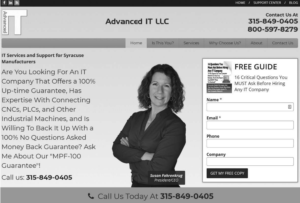
One of the most powerful marketing and business advantages you can give yourself that accelerates the sales process and dampens, and often nearly eliminates, price resistance is the USP or unique selling proposition. Candidly, most can’t articulate one because they don’t HAVE one. This is not to be overlooked or skipped over. The question “Why should I choose you over all other IT firms?” is one you MUST be able to answer succinctly and powerfully if you hope to win business away from competitors.
It’s important to know that most companies are not “born” with a USP and must strategically MANUFACTURE one. Further, a USP is not a tagline. If you can communicate your USP in a single sentence, like “Fresh, hot pizza in 30 minutes or less, guaranteed,” you REALLY have something. But most cannot summarize their USP that way and must, instead, create a list of reasons. This Marketing Example is our USP summarized on a single page we give prospects in our Shock-And-Awe box.
Because this is so important, and because so many struggle with it, I thought it worthwhile to do a review of this marketing fundamental. Let me remind you of my four-point litmus test for a powerful USP. It must be unique to you, it must have meaningful specifics, it must have a strong appeal to your target market and it must be defensible before the prospect buys. Let’s break these down…
1. It must be UNIQUE to you. Technically, no one else should be able to make the same claim. This is a tough one because anything you create that gives you a unique advantage in marketing will quickly be copied by your competition – or they will at least claim they can. That’s why the next three are so important to add depth and credibility.
2. It must have meaningful specifics. One of our members submitted this as their Unique Selling Proposition: “We’ve proven to improve both top-line and bottom-line revenue for our clients.” The problem with this statement is that it lacks specifics and therefore appears to be a marketing veneer; it’s supposed to look like real wood, but we know it’s a thin layer of fake wood glued to particle board – and people know the difference once they get a closer look. That’s not to say this member was lying or falsifying information. In fact, he had six case studies with metrics to back up his claim. The problem was that it lacked meaningful specifics. Further, he cannot truly lay 100% claim to either top-line or bottom-line. Top-line, or sales, was not an area he could directly impact other than to make sure the sales reps and company could perform – so I suggested he throw that out and instead focus on the specific area he did impact, which was IT costs. More specifically, the total cost of ownership. Using that as a metric, his unique selling proposition could be “We routinely lower our clients’ IT costs and overall technology spend by 14% to 31%.” If he really wanted to get crazy, he could guarantee it: “We guarantee to lower your overall IT costs by 14% to 31%. Call us for a free IT Services Assessment. If we cannot show you how to lower the total cost of ownership for IT by at least 14%, we’ll pay YOU $100.”
3. It must have a STRONG APPEAL to your target market. This is why you MUST start with defining the “who,” or target market, of the marketing equation. For example, one member, who was selling to medical practices, submitted this as part of his overall USP:
“We Make IT Personal – We create partnerships by building connections. We believe that working with you and your business is an opportunity to be a part of building something exceptional. We have the courage and commitment to both learn about and align with you and your team. We care for your business like it is our business and we are dedicated to its success.”
There are a few problems with this. For starters, these statements are really vague. What does “create partnership by building connections” really mean? But a bigger problem is that it’s NOT a benefit, and his target audience does NOT CARE about this. Therefore, it violates the litmus test that it must have a strong appeal. The Practice Manager of a busy medical practice just wants the ding-dang-darn systems to work; they don’t want to create partnerships and build something exceptional. So I asked this member, “WHO is your typical client, and what do they worry about? What are the biggest problems they come to you to solve?” He said it’s typically a “she” – a 40- to 60-year-old woman who is not technically savvy, does not perceive she has a problem with HIPAA, and spends her day dealing with “utter chaos,” reacting to problems, firefighting. Typically she comes to him with a single problem – the phone system is not working, they have a virus or, the big one, something with the electronic health records system is not working. BINGO. So I suggested we make this one of his USP points:
“We Eliminate Every Single Problem With Electronic Health Records. Our medical clients see a 99% reduction in EHR issues after becoming clients of ours. From slowness, workflow issues, inability to access notes on patient records, to re-entry and rework due to bugs in the system, we solve them ALL.”
4. It must be defensible before they buy. A Unique Selling Proposition must be proven. One of the points in our USP is that we have “the most documented client success stories than any other sales or marketing consultant in this industry, PERIOD.” That’s not only true, but it’s specific, meaningful to our clients, and defensible before a prospect buys. After all, they can go to our website and see the hundreds of reviews, testimonials, and case studies. Another good example is on this page from Accelerators member Susan Fahrenkrug. She’s specifically targeting manufacturers – and her USP of guaranteeing uptime and expertise in CNCs, PLCs, and other industrial machines is specific. She can back this up with testimonials and the ability to “talk shop” with any C-level executive of a manufacturing firm.

